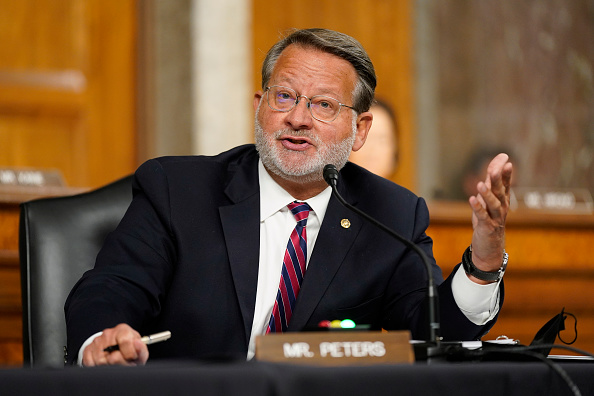The unfolding saga of the missing January 6 texts has led the chair of the Senate Committee on Homeland Security and Governmental Affairs to issue letters laying into several agency heads over how this could have happened.
On Wednesday, Senator Gary Peters (D-MI) sent four letters to top agency officials demanding more details on how the Secret Service went about deleting Trump administration text messages.
The most pointed was targeted at Department of Homeland Security Inspector General Joseph V. Cuffari, who has attracted particular scrutiny since it emerged that he waited months to alert Congress about the missing texts.
Senator Peters requests in the letter that the inspector general “clarify troubling allegations” that “contradict” the information that Cuffari had originally given Congress.
On July 13, Cuffari sent House and Senate committee chairpeople, including Senator Peters, a letter admitting that the Secret Service had erased text messages “after OIG requested records of electronic communications from the USSS.” He also blamed an internal legal review for the hold-up in alerting Congress.
However, the Project on Government Oversight reported last month that the Secret Service confirmed to Cuffari’s office that the texts were lost back in February.
Peters accused Cuffari or his leadership team of taking steps “that appear to be in direct conflict with necessary efforts to identify any wrongdoing and recover missing information” related to the Capitol riot.
He also pointed out that Cuffari’s letter didn’t disclose that messages from former high-ranking DHS officials, including former DHS Secretary Chad Wolf and former Acting Deputy Secretary Ken Cuccinelli, had also been deleted after Jan. 6.
“These are serious allegations and diverge from the information that you previously provided me and my team,” the senator wrote.
As a result, Senator Peters is requesting that the inspector general share “a complete accounting of actions planned and taken by” his office to clear up any inconsistencies in his report. Peters demanded that he confirm the date when his office first learned that the texts were deleted, detail attempts to preserve the text messages or retrieve them, and explain whether he alerted DHS Secretary Alejandro Mayorkas that the texts were deleted, as, Peters notes, is “required under the Inspector General Act of 1978.”
The senator also addressed letters requesting information to Mayorkas, USSS Director James Murray, and Defense Secretary Lloyd J. Austin III.
The Defense Department similarly wiped the phone records of former high-ranking officials from that time period, CNN reported last week, including those of former acting Defense Secretary Chris Miller and former Chief of Staff Kash Patel.
“DOD and Army conveyed to Plaintiff that when an employee separates from DOD or Army, he or she turns in the government-issued phone, and the phone is wiped,” lawyers for the DOD and Army said in a March 10 court filing, part of a lawsuit brought by good government group American Oversight, which was seeking the records.
The letters to Mayorkas and Austin similarly request that the agency leaders clarify how much they knew about when and how the texts were deleted, who they notified, and what they did when they learned of the erasures, among other demands.
The letter to Murray, however, goes a little more in-depth: In it, Senator Peters asks whether the Secret Service had any policies in place for data retention as dictated by federal rules.
He notes National Archives and Records Administration guidance which states that “electronic messages created or received in the course of agency business are Federal records.”
“Text messages are included in this description,” he writes.







Fire him.
These are dangerous lackeys left in powerful positions.
Just subpoena the bitches already. Let’s get this row on the shoad.
OT: just this great ad about the accomplishments of this administration
Speaking of DoD and Army, I sure would like somebody to talk to Mike Flynn’s brother.
Who the fuck initiated, authorized and/or carried out this alleged “data migration” of the SS text messages which, as trotted by the SS, is the most laughable fabricated excuse for deleting text messages ever put forward by anyone?